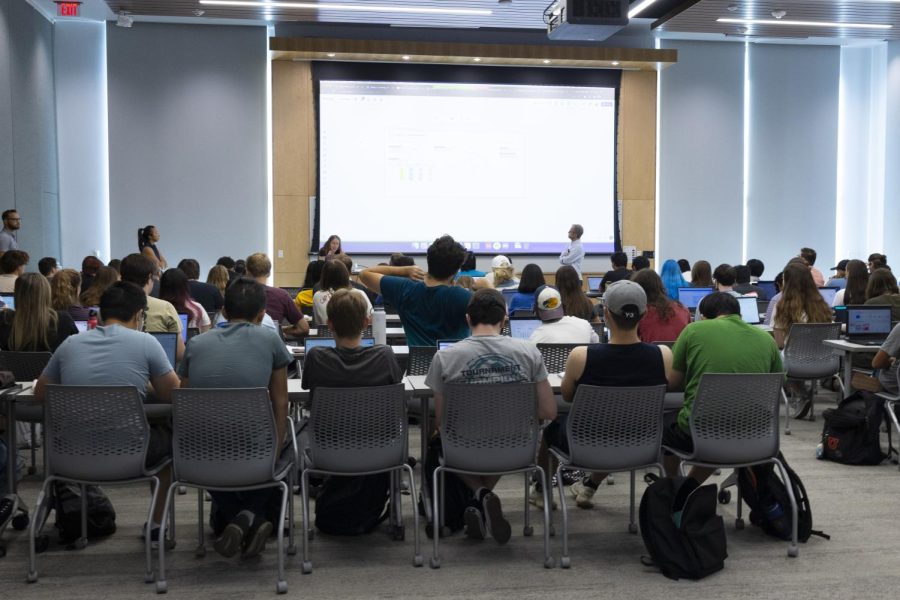Nationwide Teacher Shortage Negatively Impacts Student Education
Students of Introduction to Design Thinking in class in the Gardner Commons building at the University of Utah, Salt Lake City on Friday, Sept. 2, 2022. (Photo by Amen Koutowogbe | The Daily Utah Chronicle)
September 7, 2022
As the Fall 2022 school year begins, schools nationwide are lacking educational staff, creating a teacher shortage.
In Utah alone, schools are expected to face a shortage of almost 200,000 teachers by 2025, with many districts being unable to retain teachers for more than five years, according to a 2021 performance audit of teacher retention in Utah’s public education system.
According to Mary Burbank, associate dean for teacher education at the University of Utah, the amount of people retiring from the education field greatly exceeds those entering, with the pandemic playing a huge role in these teacher vacancies.
“There’s just the natural demographics of our country in terms of the number of people who are reaching the age of retirement,” Burbank said. “The reason that a number of positions are going unfilled is because of the number of people who have retired or are planning to retire because of COVID.”
Burbank said that more recently, many people who were once interested in teaching are realizing that the education field is very strenuous mentally and financially, with many people choosing another career path altogether.
“Just the nature of teachers’ work, it’s demanding work, it’s increasingly challenging work,” Burbank said. “You can’t dismiss low pay. That’s one of the top reasons people don’t go into the profession.”
Overworked and Underpaid
Eunice Han, an economics professor at the U, said many teachers are tired of getting paid low salaries, and that the lack of substantial wages is turning many people away from the education field.
“People were saying they realized that teaching is not paying enough,” Han said. “We call that ‘teacher wage penalty’ because being a teacher seems like you’re getting a penalty in the job.”
According to one estimate, in order to be able to live in Utah comfortably, one’s salary must be anywhere from $43,000 to $66,000 per year to cover needs for housing, food, transportation, health care and taxes. The average teacher salary in Utah is roughly $52,000. Additionally, many teachers are earning significantly less than people with the same level of education, according to Economic Policy Institute, with this wage gap worsening each year.
Han said the lack of adequate compensation isn’t the only factor pushing people away from the education field.
“So the pay aside, you have a large class size, longer teaching hours,” Han said. “People say the benefits are great, but it’s not the benefits that we think covers all the cheater wage penalty. It’s not enough to cover the low salary.”
Burbank said she thinks teachers are not only being paid an inadequate salary but have been expected to take on more roles than just educating in the last few years, making their job more difficult than most people understand.
“Teachers are increasingly expected to take on a range of roles that are beyond just teaching content,” Burbank said. “There are health needs, and there’s preparing children in areas that historically have not been the responsibility of schools.”
Burbank said overcrowded classrooms can also negatively impact students by affecting methods of teaching and decreasing one-on-one time with students.
“If you want to understand students, if you want to connect with students, if you want to customize instruction, if you want to connect with families, it’s much more difficult to do that when you have 40 students versus 25,” Burbank said.
Impact on Students
Han said the nationwide teacher shortage has had a negative impact on schools and teachers but is most damaging to students.
“Teachers are going to be tired, they might be grumpy coming in because they’re already so burnt out,” Han said. “[A] grumpy teacher is not going to be a productive teacher at all.
Han said the teacher shortage has been worsening for decades and is unlikely to be fixed unless action is taken to raise teacher salaries.
“A 10% increase in teacher salary isn’t going to fix the problem because inflation is already 9%. So giving our 9% increase in teacher salaries just makes them break even,” Han said. “Give them 20%. Give them a 30% increase, at least in the long run. If you don’t promise that, no one is really going to go into the teacher preparation program.”
While teachers and teacher unions have been asking for raises, oftentimes local governments are unable to provide the money needed for this, according to Han. The only solution, she said, is for progressive action to take place before it’s too late.
“So if it’s not going to be fixed locally, the federal government has to step in, or the state government has to step in because the U.S. education system relies on the local source for teacher pay,” Han said. “That’s just not going to work because it hasn’t worked so far … we need every layer of government to try to come in and help.”










Cindy SK • Sep 8, 2022 at 11:57 pm
It is true that teachers are woefully underpaid. Yet, many of those leaving the profession do so, not because of pay but the increasingly hostile conditions facing teachers.
Teachers are attacked for teaching historical facts, teaching classic literature, teaching science, and–oh my!–teaching tolerance and respect for everyone.
Until teachers are given the respect their profession deserves, pay raises will never be enough.
From students who insist on receiving grades they have not earned to parents who blame teachers for their child’s refusal to do homework or turn in assignments, teachers face a barrage of criticism. To make matters worse, they are then abandoned by administrators and legislators who insist on catering to a vocal minority of those who seek to undermine the very practices that lead to good teaching.
These are not suppositions. My wife is a teacher and I marvel every day that she still wants to go to work! Yet, she, like so many others, muddles through in spite of all of the attacks, all of the barriers, all of the challenges because she loves teaching. She rejoices in the positive things she brings to her students’ lives. She has a teacher’s heart.
The time has come to give teachers the respect and dignity those hearts deserve.